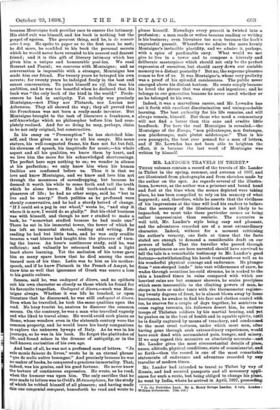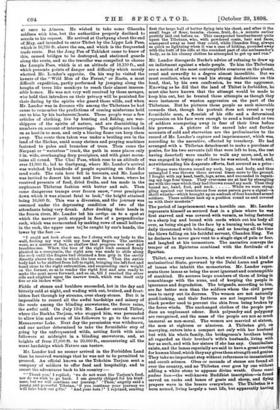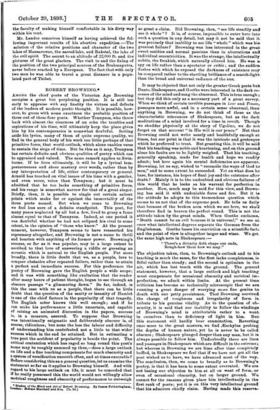MR. LANDOR'S TRAVELS IN THIBET.*
THESE volumes contain a record of the travels of Mr. Landor in Thibet in the spring, summer, and autumn of 1897, and are illustrated from photographs and from sketches made by the author on the spot. As regards several of the illustra- tions, however, as the author was a prisoner and bound hand and foot at the time when the scenes depicted were taking place, he has been compelled to rely on his memory of what happened ; and, therefore, while he asserts that the vividness of his impressions at the time will lead his readers to believe that the accuracy of the illustrations is not likely to be impeached, we must take these particular scenes as being rather impressionist than realistic. The narrative is well told, Mr. Landor's style being easy and pleasant, and the adventures recorded are of a most extraordinary character. Indeed, without for a moment criticising the author's veracity, one feels at times that the facts stated are enough to demand a considerable draft on our powers of belief. That the traveller who passed through such experiences as are here narrated should have survived to tell the tale is a remarkable testimony to Mr. Landor's good fortune—notwithstanding his harsh treatment—as well as to his wonderful physical courage and endurance. He plunges from " sun-steeped lands " into vast wildernesses of snow, he wades through countless ice-cold streams, he is soaked to the skin a hundred times in rains compared with which our heaviest rains are but summer showers, he scales precipices which seem inaccessible to the climbing powers of man, he sleeps in huts or under tents with the thermometer register- ing twenty degrees of frost, he is almost blown away by fierce hurricanes, he awakes to find his face and clothes coated with ice, he starves for a couple of days together, he contrives to cross raging torrents, his followers desert him, he scatters troops of Thibetan soldiers by his martial bearing, and yet he pushes on in the best of health and in equable spirits, until he is finally captured by means of treachery, and condemned to the most cruel tortures, under which most men, after having gone through such extraordinary experiences, would have sunk dead with accumulated pain, hunger, and misery. If we may regard this narrative as absolutely accurate—and Mr. Landor gives the most circumstantial details of place, name, altitude, physical conditions, state of commissariat, and so forth—then the record is one of the most remarkable statements- of endurance and adventure recorded by any traveller of modern times.
Mr. Landor had intended to travel to Thibet by way of Russia, and had secured passports and all necessary appli- ances for such a route, but being obliged to change his plans, he went by India, where he arrived in April, 1897, proceeding
• In the Forbidden Land. By A. Henry Savage Landor. 2 vole. Loadon : William Heinemann. [326. net.]
at once to Almora. He wished to take some Ghoorka soldiers with him, but the authorities properly declined to accede to his request. He arrived at Garbyang about the end of May, and intended to enter Thibet by the Lippu Lek Pass, which is 16,780 ft. above the sea, and which is the frequented trade route. Bat the Jong Pen of Taklakot came to know of this, caused bridges to be destroyed, and stationed guards along the route, and so the traveller was compelled to choose the Lumpia Pass, which is at an altitude of 18,150 ft., and which presents points of danger and difficulty which merely whetted Mr. Landor's appetite. On his way he visited the haunts of the " Wild Men of the Forest," or Raots, a most difficult expedition, partly performed by jumping along the boughs of trees like monkeys to reach their almost inacces- sible homes. He was not very well received by these savages, who hold that intruders on their privacy will be punished for their daring by the spirits who guard these wilds, and when Mr. Landor was in durance vile among the Thibetans he had cause to remember the predictions of coming misfortune held out to him by his barbaroxis:hosts. These people wear a few articles of clothing, live by hunting and, fishing, are wor- shippers of the spirits of nature, and are diminishing in numbers on account of intermarriage. The spirits are looked on as hostile to man, and only a blazing flame can keep them away. The route then taken was under a broiling sun in the land of the Shokas, amid many shrines and praying machines Fastened to poles and branches of trees. Then came the Nerpani or " waterless " track, the path in some places only 6 in. wide, overhanging deep precipices, and with giant moun- tains all round. The Chai Pass, which rose to an altitude of over 11,000 ft., led to Garbyang, where Mr. Landor's arrival was watched by hundreds of people squatting on their flat mud roofs. The rain here fell in torrents, and Mr. Landor was invited to desert his tent and live in a house, where he received presents of food, dried fruits, and tea made in the unpleasant Thibetan fashion with butter and salt. Then came dangerous tramps over frozen snow, "over precipices down which it was almost fatal to look," the height attained being 16,000 ft. This was a diversion, and the journey was resumed under the depressing condition of two of the attendants being very drank. After ducking their heads in the frozen river, Mr. Landor led his cortege on to a spot at which the narrow path stopped in face of a perpendicular rock, which was surmounted by making rows of small hollows in the rock, the upper ones to) be caught by one's hands, the lower by the feet :—
" I could not look about me, for I clung with my body to the wall, feeling my way with my toes and fingers. The cavities were, as a matter of fact, so shallow that progress was slow and troublesome. When the toes of the right limb seemed firmly planted in a receptacle, the right arm was made to slide along the rock until the fingers had obtained a firm grip in the cavity directly above the one in which the toes were. Then the entire body had to be shifted from left to right, bringing the left foot and hand close to the right extremities, and suspending one's weight on the former, so as to render the right foot and arm ready to make the next move forward, and so on, till I reached the other side and alighted upon the narrow track, which was itself only five or six inches wide."
Fields of stones and boulders succeeded, hot in the day and bitterly cold at night, and wading with cut, bruised, and frost- bitten feet through icy streams, over sharp stones. But it is impossible to record all the awful hardships and misery of the route among the blinding snowstorms, the fierce rains, the awful cold. On July 13th Mr. Landor entered Thibet, where the Barkha Tarjum, who stopped him, was persuaded to allow him and seven of his followers to go to the sacred Mansarowar Lake. Next day the permission was withdrawn, and our author determined to take the formidable step of going by the unfrequented wilds, setting forth with nine followers at midnight in a blinding snowstorm, and, at heights of from 17,000 ft. to 20,000 ft., encountering all the worst hardships which Nature can bestow.
Mr. Landor had no sooner arrived in the Forbidden Land than he received warnings that he was not to be permitted to proceed. An official known as the Tokehim Tarjum sent a company of soldiers to offer food and hospitality, and to escort the adventurer back to his country :-
"' Thank you,' I replied; ' we do not want the Tarjum's food, nor do we wish to go back. I am greatly obliged for his kind. ness, but we will continue our journey.' Then,' angrily said a young and powerful Tibetan, if you continue your journey we will take back our gifts." And your /sofa ! ' I rejoined, sending first the large ball of butter flying into his chest, and after it the small bags of flour, tsamba, cheese, fruit, &c., a minute earlier prettily laid out before us. This unexpected bombardment quite upset the Tibetans, who, with powdered coats, hair and faces, scampered away as beet they could, while Chanden Sing, always as quick as lightning when it was a case of hitting, pounded away with the butt of his rifle at the roundest part of one ambassador's body, as in his clumsy clothes he attempted to get up and run."
Mr. Landor disregards Burke's advice of refusing to draw up an indictment against a whole people. To him the Thibetans are a nation of the most contemptible creatures on the planet, cruel and cowardly to a degree almost incredible. But we must recollect, when we read his strong declarations on this head, that, by his own confession, he was the aggressor. Knowing as he did that the land of Thibet is forbidden, he must also have known that the attempt would be made to keep him out, but he treated these attempts as though they were instances of wanton aggression on the part of the Thibetans. Bat he pictures these people as such miserable cowards that, though his portrait does not reveal a very formidable man, a flourish of his rifle and a determined expression on his face were enough to send a hundred or two of soldiers scampering away in fear of their lives before his prowess. A picture of the sacred lake and further accounts of cold and starvation are the preliminaries to the record of Mr. Landor's capture and imprisonment, which was, according to the narrative, effected by treachery. He had arranged with a Thibetan detachment to make a purchase of ponies, for his two servants (all that were left to him, the rest having deserted) were unable to walk any more, and, as he was engaged in trying one of these he was seized, bound, and, notwithstanding his desperate efforts, fast secured as a prize :
"Ropes were thrown round my neck, legs, and body, and thus entangled I was thrown three several times more to the ground. I fought with my head, teeth, legs, arms, and succeeded in regain• ing my legs four times. They overcame me at last by strangling me with the rope which they had thrown round my neck. Then they bound me, hand, foot, and neck While we were strug- gling against our treacherous foes some person gave a signal—a shrill whistle—which brought up an ambush of four hundred armed soldiers. These soldiers took up a position round us and covered us with their muskets."
The period of imprisonment was a horrible one. Mr. Landor represents himself as secured fast in a place where he was first starved and was covered with vermin, as being fastened to a sharp log and bound with cords which cut his body all over, as being sin ged in the face by a burning torch, as being daily threatened with beheading, and as hearing all the time the blows falling on his faithful servant, Chanden Sing. Yet he declares he never gave vent to a single sign of pain or fear, and laughed at his tormentors. The narrative conveys the temper of an Epictetus combined with the fortitude of a Spartan.
Thibet, as every one knows, is what we should call a kind of ecclesiastical State, governed by the Dalai Lama and grades of lamas who inhabit the monasteries. Mr. Landor repre- sents these lamas as being the most ignorant and contemptible of mankind. He accuses large numbers of them of living in concubinage with the nuns, and of keeping the people in ignorance and degradation. The brigands, according to him, are far better men than the soldiers whom the civil power uses to carry out its decrees. The women are not naturally good-looking, and their features are not improved by the black powder used to prevent the skin from being broken by the fierce winds. The unchanged clothes of the people pro- duce an unpleasant odour. Both polyandry and polygamy are recognised, and the mass of the people are not so much immoral as non-moral. The women are married at sixteen, the men at eighteen or nineteen. A Thibetan girl, on marrying, enters into a compact not only with her husband but with his whole family, the bridegroom's brothers being all regarded as their brother's wife's husbands, living with her as such, and with her sisters if she has any. Cannibalism exists, and the lamas especially are said to have a great craving for human blood, which they say gives them strength and genius. They take no important step without references to incantations
and occult science. Obos or mounds of stones are found all over the country, and no Thibetan ever goes by one without adding a white stone to appease divine wrath. Omne mans padme hun—the well-known Buddhist inscription—is found carved on rocks and bones of goats and sheep, and flying prayers wave in the breeze everywhere. The Thibetan is born nomad, living largely a tent life, but apparently having
the faculty of making himself comfortable in his dirty way within his tent.
Mr. Landor conceives himself as having achieved the fol- lowing important results of his abortive expedition :—The solution of the relative positions and character of the two lakes of Mansarowar, the sacred lake, and Raketal, the lake of the evil spirit The ascent to an altitude of 22,000 ft. and the pictures of the great glaciers. The visit to and the fixing of the position of the two principal sources of the Brahmaputra, never before reached by a European. The fact that with only two men he was able to travel a great distance in a popu- lated part of Thibet.








































 Previous page
Previous page